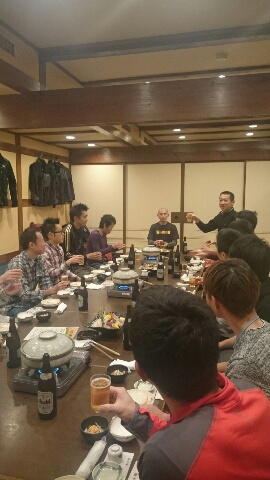talking cycling
 The Niigata prefecture cyclist's end of season party on saturday night.
The Niigata prefecture cyclist's end of season party on saturday night.
It's always great to talk about this year's results. Next year's goals.
After starting to work with a coach I find myself talking differently than in previous years. More focused. Clear goals and objectives.... At least until the beers kick in....
Talking with my coach on Monday. Our 4th meeting. 90 minutes on Skype.
Each time we are putting the pieces together. Building a plan specific for me.
Here are the notes from the meeting:
Periodization and the ATP
Most training plans are based on periodization. Base, Build, Peak, Race. High volume & low intensity at first. Replaced by lower volume & higher intensity later. These higher intensity efforts are useful for racing skills such as attacking, bridging, sprinting etc.
However, we are wondering how relevant these skill will be to my target A races? We envisage the required skills to be a long TT effort (Tokyo~Itoigawa) and a long endurance effort with some more strategy (Fuji and Motegi)
Should we keep more volume? We need to customize the training plan, trading off volume and intensity. ex: high volume / mid-intensity.
Other coaches are being consulted about this. We are waiting for their feedback.
One training theory is "reverse periodization". High intensity at first. More volume later. Maybe I've done this unknowingly in the past as I spent the winter months in zone 3 on the rollers, before doing long volume (lower intensity) rides on the road in the spring. We are not sure if we should follow this method though.
November's training.
Most of November has been work in zone 2. Rollers, cross training and low intensity strength work. The hours are close to the ATP.
1 rest day a week is a good habit.
Most exercises produce a TS value of 0.5 to 0.6. It is difficult to train below this intensity. A gentle ride with children for example would produce a lower score.
Weekly TSS totals are around 600. These will likely become higher as training intensity increases.
Preparation phase
Currently I am in the preparation phase. There are 2 more weeks of this phase. Around 12 hours are allocated to each week. Hitting the target is not so important. It will be come less important as we become to understand my TSS and response to training.
Base phase
There are three specific skills to focus on in the base phase:
1. endurance - cross training, rollers
2. force - strength training
3. speed skills - exercises to improve pedal efficiency
As we move into the base phase, I will continue to get lots of my cardio work through cross training.
For force, I will continue to do strength work. I will slowly reduce the repetitions and increase the weight. I am happy with my progress so far. Later I would like to try some new exercises like "jumps"
For speed skills, I will practice:
•1 legged drills
•high cadence (130 rpm)
•ankling
1 legged drills can help to highlight deadspots. They can also help to recruit muscles that are not being recruited.
I will look more closely at "ankling" and how this can improve my pedal stroke.
Transition phase
After the base phase the transition phase deals with "advanced skills".
The TSS score
As a general guideline, an athlete can train the next day if his TTS doesn't exceed 100. 100~200 would require a day's rest. 200 + would require 2 or 3 days rest. Every individual is different. I have a big base and I am used to riding big 180 to 200 km rides. We will try to assess my response to training stress.
Coach - athlete relationship
Weekly training plans are usually sent to athletes on Sunday evening. However, we envisage this will be a more collaborative working relationship.
We are looking forward to a rewarding and successful year on the bike in 2015!
Next meeting
December 15th, 10 pm
トラックバック(0)
このブログ記事を参照しているブログ一覧: talking cycling
このブログ記事に対するトラックバックURL: http://www.jyonnobitime.com/mt/mt-tb.cgi/2860






コメントする